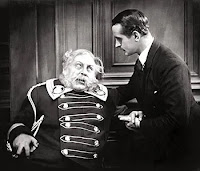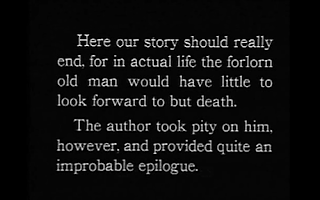(1924)
Directed by F.W. Murnau
Screenplay by Carl Meyer
Starring Emil Jannings
IMDB Entry
Interest in silent films is fading and younger audiences don’t have a lot of regard for them. If there is anything still relevant, it’s usually silent comedies from Chaplin and Keaton. But there were plenty of good dramas, too, and one of the classics is The Last Laugh.
The story is a simple one. A hotel doorman (Emil Jannings) is happy in his job, which is quite prestigious. People in his neighborhood tip their hats and salute him. But the doorman is getting old and, when he is spotted taking a break, his boss decides he’s not up to the job, and reassigns him to be a restroom attendant.This breaks him. He keeps his uniform so the neighbors don’t realize his loss of status, but the secret is eventually found out, earning him the scorn of his family and everyone who knows him.
The tragedy is averted by a tacked-on ending that even the director thinks is improbable.*
Jannings was a top actor of the late silent days. This wasn’t the only time he played a tragic protagonist and he even was the first winner of the Best Actor Oscar. He returned to Germany immediately after**, knowing that his German accent was not going to fly once sound came in. He made his most successful film, The Blue Angel, there, playing opposite Marlene Dietrich. Though he was still an important actor in Germany, his legacy was tarnished because he made Nazi propaganda films. Though he argued that he had to make the films, his career ended with the end of the war. Dietrich, who fled Germany and was a staunch anti-Nazi, hated him for it.
From a technical point of view, the film was groundbreaking. Murnau and Mayer wanted to avoid intertitles and there is only one in the entire movie. In addition Murnau, working with cinematographer Karl Freund,*** developed camera techniques that had never been tried before and which were quickly emulated. Murnau is considered by film scholars as one of the greatest directors, and this film shows why.
One aspect of the film that is not clear is the background of German cultural assumptions, which were not known to the American audiences when it came out and are even more obscure now. The doorman’s prestige was because he wore a uniform**** and the demotion devastates him for that reason. Another point is the German title, Der letzte Mann. Literally, it means “The Last Man,” but another meaning is “The man who used to have this job.”
The film was a big success, both critically and financially, and is still highly regarded by film schools and students. The acting style may be dated, but if you watch, you will be moved by the doorman’s fate.
__________________________________________________________
*He specifically says so in the single intertitle.
**I’ve seen accounts that he was waiting for a train to take him to New York to sail to Germany when he learned he had won.
***Freund moved to the US and worked on movies like the original Dracula (sharing directing duties uncredited), The Mummy, and Mad Love.
**** Murnau thought the story absurd because "everyone knows that a washroom attendant makes more than a doorman."



No comments:
Post a Comment